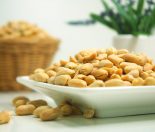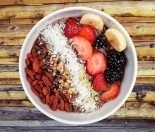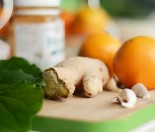Children need iron in their diet. Read about iron for children — child requirements, types of iron, causes & symptoms of iron deficiency, iron absorption, anemia, how to improve the iron content in their food, and more.
Iron is a mighty mineral, essential for energy, concentration and mental functioning in people of all ages. It is an especially important mineral for children, who are growing and learning at an incredible rate.
Iron deficiency in children
Iron is a mineral found in every cell of the body. It helps carry oxygen through the bloodstream, to create energy and sustain a healthy immune system.
Iron deficiency occurs over time when the stores of iron in the body run low. This can then lead to anaemia – a reduction of heamoglobin, the red blood cells that carry oxygen around the body.
Iron deficiency affects up to 25% of children under the age of three in New Zealand.
The symptoms of iron deficiency in children
- low energy levels
- lowered immunity – increased risk of infections
- impaired learning
- for young children it can also lead to poor appetite.
Some studies have shown that iron deficiency may affect how well infants perform certain cognitive or mental tasks. There may also be an association with some social problems – the infant may be more emotionally unstable, less alert, and unlikely to explore their environment. The iron-deficient toddler may also be less attentive and less active. While iron deficiency is not the only reason for such behaviours, more and more research is showing that iron, or the lack of it, can have a significant effect on child development.
Causes of Iron deficiency in children
Iron deficiency in children is usually diet-related. The most common causes include:
- Exclusively breast feeding after six months as breast milk alone after six months is not sufficient to meet an infant’s iron needs. The new 2007 draft guidelines put out by the NZ Ministry of Health state:”The depletion of iron stores from birth and increased demands of growth indicate that after six months of age infants are critically dependent on dietary iron supplied from complementary foods even with continued breastfeeding.”*The full-term baby generally has enough iron stores to last until around six months of age, but after this time it is important to introduce solids that contain iron, such as red meat, chicken, or baby cereal with iron.
- Introducing cows milk as a drink within the first year of life, or a very high intake of cows milk after the age of one. Breast feeding or an infant formula should be the only source of milk drinks in the first year. Cows milk as a drink is too low in vitamins and minerals and too high in salt and protein for a baby under 12 months. Children older than one year, with a very high cows milk intake, are likely to have a poor intake of other foods. The recommended daily milk intake for a one year old is about 2 cups.
- Lack of meat:- while it is possible to meet iron requirements on a vegetarian diet, more care may be needed with food choices. (Read on for information on good sources of iron in the diet.)
- Inadequate overall food intake: refusing food or grazing.
- Lack of vitamin C: foods rich in vitamin C assist with iron absorption.
Iron is extremely important in a toddler’s diet, but toddlers – often picky eaters at the best of times – eat only small meals so how can we ensure that they get the iron they need?
There are two types of iron in the food we eat
Haem iron
This is found in blood-rich foods such as red meat, poultry and fish. This type of iron is up to 10 times more readily absorbed in the body than non-haem iron.
Excellent sources of haem iron include:
- kidneys and liver
- lean beef and lamb
- canned sardines and canned tuna.
Good sources of haem iron include:
- lean chicken
- lean pork
- fish, such as snapper
Non-haem iron
This is found in plant-based foods. Sources of non-haem iron include some vegetables, cereals, fruits and legumes (beans and peas).
Sources of non-haem iron include:
- porridge and breakfast cereals with added iron
- baked beans, cooked dried beans, tofu
- lentils, split peas
- peas, silverbeet, spinach and broccoli
- puha
- raisins, dried apricots
- eggs
- wholemeal bread.
Including red meat in a meal will significantly boost absorption of non-haem iron. For example, the iron found in silverbeet will be more readily absorbed if red meat is also part of the meal.
Vitamin C has an important role in iron absorption
Another way to improve the absorption of non-haem iron is to eat foods that are rich in vitamin C – citrus fruits, tomatoes, kiwifruit, cauliflower, broccoli, berry fruit, and fruit juices.
Therefore, a serving of fruit with breakfast cereal will act as a booster for iron absorption. Try to limit fruit juice however, as a high intake of juice will reduce a child’s appetite.
Vegetarian diets for children
Children on vegetarian diets eat more fibre than children who eat meat. A high-fibre diet can interfere with a child’s ability to absorb iron. To help lower the fibre content of a child’s vegetarian diet, use a range of bread types, including white or wholemeal breads, not just whole grain breads. Avoid breakfast cereals that have bran added, and offer white pastas and rice, not just brown or wholemeal varieties.
Fussy meat eaters
Some children simply refuse to eat meat. It might be that they dislike the taste or the texture, but usually it is that they do not like chewing. If this is the case, try the following suggestions:
- mince-based dishes such as meatballs, shepherd’s pie, homemade hamburger patties
- soft meats, such as liver, pate, meat pastes or spreads
- fish and chicken
- thinly sliced meats, such as ham, bacon, roast meats, meatloaf
- moist meat dishes, such as casseroles
- try giving the child meat earlier in the day, not just in the evenings when the child may be tired, irritable and less receptive to chewing.
It is important to offer children a wide variety of foods to ensure your child gets an adequate amount of iron.
Check it out before you supplement!
A child who is more than usually tired, a picky eater, emotionally unstable, or inattentive may not be getting enough iron from food. If you are concerned that your child may have an iron deficiency, do not give iron supplements without first having this diagnosis confirmed by a doctor. There are a small, but significant, number of people who suffer from a condition known as haemochromotosis where levels of iron are too high in the body. For this reason it is always important to first have your child’s actual iron status checked by a doctor before iron supplements are considered.
*Reference: NZ Ministry of Health Food and Nutrition Guidelines for Healthy Infants and Toddlers (Aged 0-2): A background paper.
Useful Articles
For information on Food Labels at a Glance click here.
Iron is an important nutrient in pregnancy. For more information see our article on Iron in Pregnancy







HI, Interesting that 25% of toddlers in NZ are iron deficient. Do you have a reference for this? thanks
Hi Sara,
I have contacted Fiona about this and she has suggested this resource: http://www.health.govt.nz/publication/food-and-nutrition-guidelines-healthy-infants-and-toddlers-aged-0-2-background-paper-partially
Hope it helps!
Rochelle
Hi,my 4yrs old is suffering 4rm stumach ache n wen she goes no 2 she become beta,recently she’s been crying saying I must rub her hand as she feels she got cramp it comes n goes,Could she be lacking iron in her body?she’s a very fussy eater plz advice tank u
Hi Fathima
I’m a nurse and it sound like your little 4 year old may be constipated and experiencing discomfort when she passes no 2. You mentioned that she is a fussy eater and may not be getting enough fibre in her diet which means that her bowel motions will be firmer and difficult to pass. As this is a regular occurrence It might be worth visiting your GP and getting medical advice.
Good luck
Hi there, can not having enough iron affect memory loss in a 3 – 4 year old??